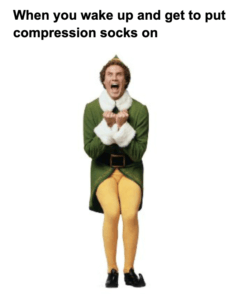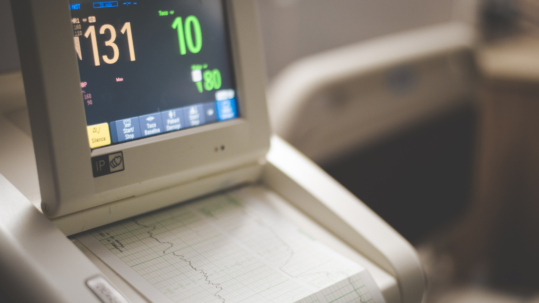
06 Dec My 8 POTS Essentials
Living out the lifestyle changes that are recommended for postural orthostatic tachycardia syndrome (POTS) can be easier said than done. Having POTS is hard. It’s inconvenient. It is not fun. But in the midst of daily limitations, finding small yet meaningful ways to make life easier is important to physical and mental well-being. If you’re looking for helpful ideas, want to compare and contrast, or are just plain curious, welcome! Here are some things that I utilize to make life easier:
-
Shower Chair
Using a shower chair is undeniably the most important life change I’ve made since developing POTS. With 100% of my showers, I would experience an average heart rate of 140bpm, weakness/collapse upon getting out, lightheadedness, burning/swollen feet (blood pooling?), and literal *hours* of laying flat afterwards to recover. You can see why it was my LEAST favorite life task. Initially, I got a $5 five-gallon bucket at a hardware store and turned it upside with a washcloth on top to make it a makeshift shower chair. It totally worked, and became my new favorite thing. Since then I’ve gotten a real-deal white plastic shower chair, and it too, is a life-saver (although my heart still belongs to my bucket. Ha!).
-
Cane
Using a cane was a big step for me, and one that took time. As my POTS symptoms worsened over the last year, I found myself having more issues with balance and often felt afraid that I was going to collapse at any moment. I was trailing my hand along walls, using counters or nearby chairs to stabilize myself, and had fallen to the ground after getting up too quickly on more than one occasion. Using a cane makes me feel safe, stable, and more confident. I have a whole article discussing using a cane for POTS, and you can check it out here.
-
Disability Parking Tag
I have personally found a disability parking tag to be a necessary part of living with POTS, and you might too. There are days when the tag enables me to go to events or places I would otherwise be unable to attend, whether it’s for socializing, learning, or retrieving basic necessities. My doctor was very supportive, noting that my additional diagnoses such as chronic fatigue syndrome and central sensitization require a greater level of care surrounding overexertion, and a parking tag is a great way to help mitigate that risk.
That said, each person with POTS has a slightly different range of symptoms – some need to sit down after a few minutes of walking, and others are able to run a 5k with some commitment to training. Mobility depends on the subtype of POTS, medication success, and lifestyle factors, so not every potsy will qualify or benefit from a disability parking tag. Asking your doctor or physical therapist can help clarify if it would be of benefit to you.
-
Compression

The first time I put knee-high compression socks on, I announced I was in love. My mother had ordered me some DELIGHTFUL polka-dotted socks from Wellow, and they were the BEST. They resolved my swelling/burning feet, they helped me feel more stable, and I really did feel they helped with the tachycardia and lightheadedness too. My cardiologist insisted I try waist-high compression as well, so when they arrived I was excited to see how they would feel.
I will admit that waist-high compression is wildly more difficult to put on than I expected! By the time I got into my first pair, I had punched a hole in the fabric, bent a nail backwards, and was bleeding on my forearm from who-knows-what. But all that said, they were revolutionary. It’s hard to explain. You know how a glass of cool water feels when you’re hot and dehydrated? Or when you get a long hug during a season of isolation? It’s kind of like that. It makes sense. It feels good. It’s what I was missing.
For several months I found compression to be a daily requirement, and would sometimes even layer waist-high compression with compression socks. However, just recently I have suddenly found it difficult to wear any compression without feeling trapped and uncomfortable, but I have also been having issues with restless legs, and believe there is a correlation. I am curious to see how treating the restless legs will impact my ability to wear (and thrive in) compression, and I hope I can get back to the glory days of stability, groundedness, and comfort that I used to experience.
-
Blood Pressure Cuff
Not all potsies have issues with their blood pressure, but I find mine to be a little unstable. I’ve had days where I’ve been BOTH hypertensive (high blood pressure) AND hypotensive (low blood pressure), and it definitely something to keep an eye on in a person whose autonomic nervous system is faulty. For several months I was also experiencing random (and frequent) drops to around 80/40, and so knowing my numbers was crucial to managing my salt and liquid intake, as well as knowing when it was or wasn’t safe to come up against my physical limits.
In addition, the medication I am now on for POTS (called Midodrine) is one that raises blood pressure, so knowing my numbers at home is vitally important to me in managing dosing, frequency, and overall success.
-
Electrolytes
Speaking of low blood pressure, when I feel like I’m going to pass out, I immediately reach for Vitassium FastChews or Liquid IV. They work quickly to boost blood volume and maintain circulation, and yes, they work. For daily use, I like Nuun, or drinking plain water with salty potato chips.
-
PulseOx Monitor
PulseOx monitors are epic, because they give you real-time heart rate feedback. When I’m having a flare or exercising, I value being able to see my exact numbers right away so that I can adjust my posture and intensity accordingly (or seek medical attention if needed). I did try wearing a Fitbit, but did not find it to be very accurate. For example, it will show me that I’m at 150bpm on the watch face, but the app will tell me I never breached 120bpm throughout the day. Or I will feel like my heart is racing and it will tell me I’m at a cool 85, though by manually taking my pulse I’m very clearly 100+. The pulse ox, however, has been a helpful and reliable tool that I keep in my backpack so that I can monitor my exact pulse when necessary.
-
Rice Bag
Because the autonomic nervous system impacts thermoregulation, I often find myself too warm at my core, but with toes and fingers of ice. A microwaved rice bag has helped my bedtime routine, as it remedies the icy pain in my feet that used to keep me up at night. During a season living in a damp and cool environment, a heated blanket was also a great addition to my arsenal.
Summary
I know I’m only scratching the surface of the lifestyle adjustments that make life with POTS possible. I’m learning that every person has a slightly different strategy that works for them, and even my own needs can shift as the seasons change. If you have POTS and have found other things that are life savers in your own day-to-day, I’d love to hear about it in the comments or through the “Contact me” page!
-
Making a Full Physical Recovery – A Day-by-Day Miracle
“You should exercise more.” A brutal statement. One I had tried to fulfill on my own, and time and time again, had failed. It was a frustrating piece of advice from my doctor, and felt so out of reach as I navigated my bouquet of chronic illnesses....
27 June, 2024 No comment -
Awesome Recovery News!! And Why I No Longer Plan To Write About My Symptoms
I am so excited to report that after graduating from the 3-week Pain/Symptom Rehabilitation Center at Mayo Clinic in Rochester and continuing the program at home, I am nearly 100% recovered!...
05 March, 2024 3 Comments -
What is the Valsalva Maneuver like?
The Valsalva maneuver is EASILY the most fascinating thing I’ve gotten to do in this entire medical adventure. On the surface, it’s a fairly quick and easy part of autonomic testing, but underneath, it’s one of the coolest and most complicated mechanisms of the human body that I’ve encountered. ...
17 January, 2024 3 Comments






Pingback:Midodrine - The POTS Medication That Works for Me - Kaley Faith
Posted at 16:48h, 21 January[…] For more ideas on POTS symptoms management, check out my article My 8 POTS Essentials. […]